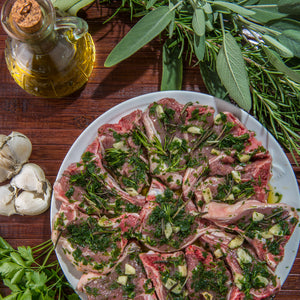Complete Guide to Marinating Meat
Complete Guide to Marinating Meat
So you want to know how to make a marinade that brings out the fullest flavor of your meat?
Ask and you shall receive, as we are happy to respond to popular demand and provide this guide on how to marinate meat, from concept to method and finally some ingredients to try for yourself.
What is a Marinade?
Before we get into the nitty gritty chemistry of how a marinade can enhance the flavor of your meat, it is important to understand what a marinade is, what it is supposed to do, and the basic components necessary to make it work.
A marinade, put simply, is a mixture of ingredients for the purpose of enhancing the texture and the flavor of meat. An effective marinade should not completely change or overpower a piece of meat’s natural taste, but will add complementary flavors.
An added benefit comes from a marinade’s softening, or tenderizing, function. This is because the enzymes and acids in marinades work to break down the fat and protein in meat in a process called denaturing, making for a softer and more tender piece of meat.
However, be careful not to let meat sit in an enzymatic marinade for too long, as you might wind up with just a mushy mess.
A marinade is composed of four basic components:
- Oils
- Acids
- Water
- Seasonings
1. Oils
Oils are essential to help seal juices in meat and keep it from drying out while cooking. They also contribute to the flavor of the dish and help offset the water in the marinade.
Be careful with the quantity of oil, as applying too much can cause flare-ups and possible burning. A good rule of thumb is to make oil less than 25% of your marinade recipe, as too much oil can also create a coating around the meat and not allow the other ingredients of the marinade to penetrate the surface.
Two of the best oils to consider using in marinades are canola and olive oil, or even a blend of each. Olive oils are a great choice health-wise, as they are high in heart-healthy monounsaturated fats.
Do note, however, that since oil and water do not mix, emulsifying agents such as soy or Worcestershire sauce are necessary to see to it that the marinade mixes evenly.
Such sauces not only bring water and oil together, but also add quite a good deal of flavor themselves. Just be sure to use them in moderation so as not to overpower the natural flavor of the meat.
2. Acids
As mentioned previously, acids work to break down the tissues in meat and help make the meat juicier.
Popular acids to include in marinades include vinegars, citrus juices and wine.
Flavor is the most important factor to consider when choosing an acid, as certain acids naturally pair better with certain kinds of meat. For example, bourbon traditionally pairs well with citrus juices or vinegars.
3. Water
Water is essential in a marinade for multiple reasons, as it not only acts as a carrier for flavorful spices, but also assists in the diffusion process, by which additives in a marinade seep into the meat.
One tip is to keep the proportion of water roughly in line with the amount of oil in the recipe, given that they offset each other in the marinade.
4. Seasonings
Last but certainly not least, seasonings are where you can get really creative with your marinade recipe.
Staples of the pantry include rosemary, thyme, pepper, garlic, and basil. We are big fans of Merquén spice ourselves and recommend you give it a try if you are looking for a rich and smoky blend of such spices as oregano, cumin and coriander.
Experiment with impunity to find exciting new combinations of flavors to get the most out of your marinade.
How to Marinade Like a Professional
So now that the basics are out of the way, it’s time to talk strategy.
A simple and effective way to marinade meat is to place your marinade and the meat together in a carefully sealed zip lock bag. Make sure to squeeze out most of the air in the bag first, as this will help preserve the freshness of the ingredients and let you get the most out of your marinade.
With this method, ensure that all sides of the meat become evenly coated with marinade by repeatedly shaking and flipping over the bag. It is also a good idea to place the bag in a bowl or container even if sealed carefully, just in case of any small holes.
Another strategy is to skip the bag and marinate directly in a container. If you choose this option, make sure the lid of the container is air-tight, as in addition to preserving the freshness of your marinade, it is also important for preventing the stray odors and flavors of other foods in the refrigerator from entering your mix.
If marinating outside of a plastic bag, a natural way to apply marinade is to spread it on one side of the meat, flip the meat over with a pair of tongs, and then spread it on the other side.
Feel free to be generous with the marinade and take care to make sure all pieces of meat are coated evenly. Avoid using a fork when handling the meat, as the holes you create will allow juice to run out.
When finished applying the marinade of choice to your meat, be sure to always place it in the refrigerator. Thicker pieces of meat naturally require a longer marinating time, with thirty minutes per ounce a reasonable guideline.
With that said, a good rule of thumb is to never marinate for more than four hours, as the marinade breaks down the texture of meat over time and an over-extended marination period might leave the meat mushy.
It is sometimes okay to marinate for longer in the case of very dense meat, but most of the benefits will come in the first few hours anyway and it is better to be safe than sorry.
Do note, however, that fish should be marinated for no more than 30 minutes if using an acidic recipe. Otherwise, it is still a good idea to top out the marinating time for fish at a maximum of 1-2 hours, as it has a very different protein structure from meats such as beef or chicken.
Since most marinades won’t be able to penetrate much of the meat anyway, you’re more likely to get benefits from a marinade when using a leaner cut. We recommend bison meat, as it is lean, high in heart-healthy omega 3 fatty acids, and filled with vitamins and minerals.
Do’s and Don’ts of Marinating Meat
DO: Keep meat cold at all times until ready to begin the marinade. In the case of freezer storage, it is also important to defrost the meat first in the refrigerator, unless it is your intention to thaw the meat while marinating.
DON’T: Mix too many salts in the marinade, or rely too much on salt in general. While we have our reasons for recommending less salt, the simple fact is that salts tend to dry food out, and there’s no going back when meat sits too long in a salty marinade and ends up dried out as a result.
DO: Always marinate meat in the refrigerator. Keep it cold at all times and don’t marinate out on the dining room table or kitchen counter.
DON’T: Ever re-use marinade. It’s fine to make a large batch and store it in the refrigerator for later, but once you thaw some out and mix with meat, that’s it. Try using ice cube trays to store marinade until you are ready to thaw it out under some warm water and apply to your meat of choice.
Do: Use fresh ingredients to give your homemade marinade more flavor. Your health will also benefit, as you can avoid the sodium-filled and preservative-laced store-bought marinades.
Don’t: Waste money on expensive cooking wine. Many store-bought cooking wines are very salty and will contain the leftovers from other wines. After all, the wine changes when cooked anyway, making cheaper wines matched carefully with your meat a better option.
Next Steps
Now that you know the ins and outs of marinating meat, it’s time to put what you’ve learned into practice and start your journey towards becoming a maestro of the marinade.
When experimenting with herbs and spices to liven up your marinades, check out our array of unique blends and see if one strikes your fancy.
Alternatively, you can always browse YouTube for some creative do-it-yourself marinade recipes.
Happy marinating, and do let us know in the comments below any delicious recipes that you come up with.


